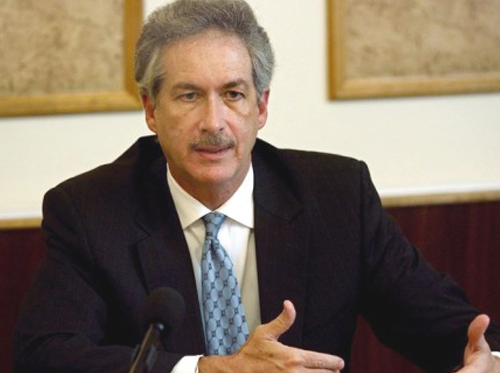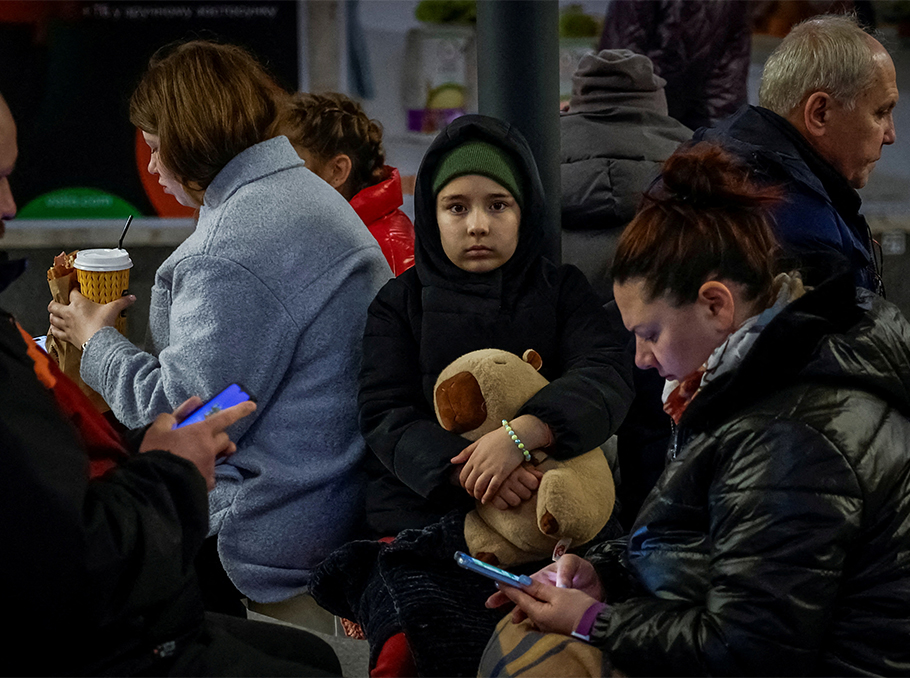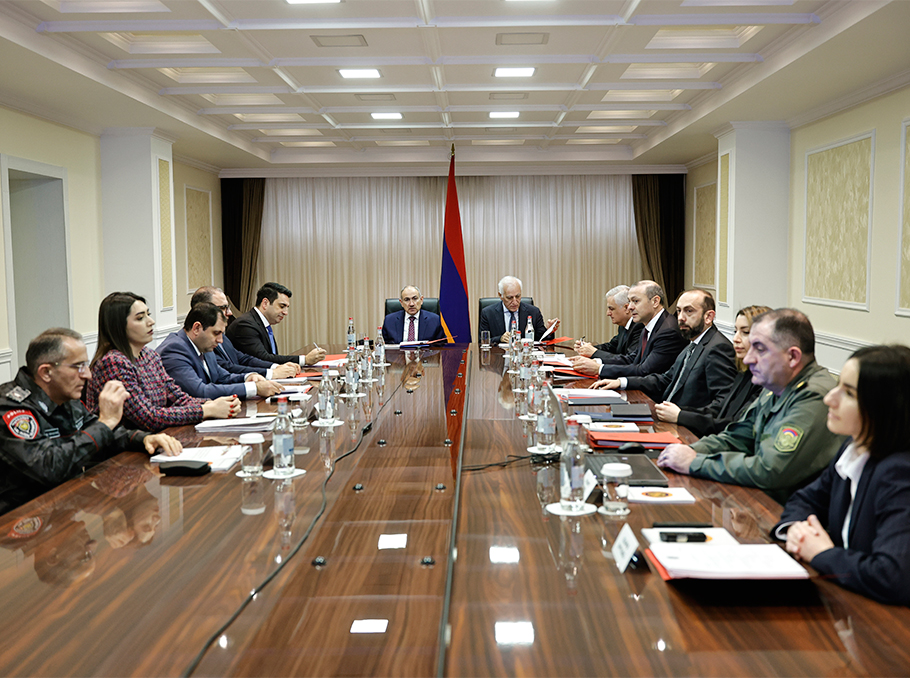U.S. Deputy Secretary of State William Burns visited Turkey this week and gave an interview to the Turkish Anadolu agency on the results of the visit. Mediamax presents the interview.
DEPUTY SECRETARY BURNS: I’m very pleased to be back in Turkey. President Obama and Secretary Clinton continue to attach very high priority to our partnership with Turkey. This is a partnership based on mutual benefit and mutual respect. It is also a partnership whose importance is only going to increase for both of us in the months and years ahead.
I had very constructive meetings over the course of the last two days with the Foreign Minister and with my friend Undersecretary Sinirlioglu. The very wide range of issues that we discussed is a strong reminder of how much the U.S. and Turkey have to gain by working together. We discussed expanding economic and commercial cooperation, as Vice President Biden highlighted at the Entrepreneurship Summit in Istanbul last month. We discussed our common struggle against terrorism, especially against the PKK, which threatens Turkey, Iraq, the United States, and the international community. We discussed Turkey’s historic constitutional reform process, and I reaffirmed the interest of the President and Secretary Clinton in supporting Turkish efforts to ensure that this process is inclusive, transparent, and respects freedom of expression so that all the citizens of Turkey can benefit.
We also addressed the historic changes that are unfolding across the Middle East and our shared interest in the success of the democratic transitions in Egypt, in Tunisia, and in Libya. Obviously these transitions are going to be shaped by the people of those countries themselves. However, Turkey offers an important model of success as a country that combines a dynamic democratic society with an active globally integrated economy and a deep Islamic heritage and culture. We discussed our shared concerns about Syria, in particular the importance of putting an end to the Assad regime’s violence against its own people and the need to bring about a rapid democratic transition. We also reaffirmed our shared concerns about Iran’s failure to meet its international responsibilities and obligations on the nuclear issue and about the importance that we attach to ensuring that Iran does not develop a nuclear weapon. Developments in Iraq, the Balkans, in the South Caucasus, Afghanistan, Cyprus, and Sudan were also among the many other issues discussed during my visit. Again, this extensive agenda is a very strong reminder of the breadth and significance of our partnership, of the positive role that Turkey plays on so many issues in this region and beyond, and of the value of the United States and Turkey working together.
- On Iran, your visit to Ankara follows the visit of Mr. Davutoglu to Tehran. What was the purpose of your visit and can you comment on its timing? Did you give any messages to Ankara, to Turkish officials about Iran, especially regarding new sanctions and Turkey’s unwillingness to impose new sanctions?
- Iran was an important item on that very broad agenda that I just described. The United States and Turkey share a common concern about Iran’s nuclear program and a common interest in ensuring that Iran does not develop a nuclear weapon. I think we have worked effectively together to underscore these concerns. Obviously sanctions—whether from the UN Security Council or taken by individual nations or groups of nations—are not an end in themselves. They are a means to an end to make clear to the Iranian leadership that it must live up to its international responsibilities and obligations. We have made clear with our partners in the P5+1, that we are prepared to engage in serious negotiations with Iran on international concerns about its nuclear program. But we are also, at the same time, deeply concerned about Iran’s failure to live up to its international obligations. For this reason, we have sought to work with friends and partners around the world to try to demonstrate that there are consequences to not living up to those obligations. President Obama has made clear on many occasions that the question is not whether or not Iran has a right to the peaceful development of nuclear energy, it is whether Iran is living up to the responsibilities that come with that right, just as we would ask of any country around the world. We want to work with Turkey and with our other partners to try to make this clear to the Iranian leadership.
- You said that we share the same concern about Iran but Mr. Davutoglu said in a recent statement that ‘We do not see Iran as a threat.’ So how do you evaluate the U.S. and Turkish policies? Are they drawing apart from each other or converging?
- I believe that the United States and Turkey share a broad strategic concern about the possibility of Iran developing a nuclear weapon. I think both of our countries agree strongly that this would be a very dangerous and destabilizing development for the entire region. While it is true we sometimes differ over tactics, I think we share that strategic concern, which is very important.
- What about your evaluation about resuming the nuclear talks between European Union and Tehran? Mr. Davutoglu suggested while in Tehran that talks could be renewed in Istanbul. Would the resumption of nuclear talks help decrease tension in the region, especially regarding the Strait of Hormuz?
- First, on the Strait of Hormuz, this is not just a concern of the U.S. or Turkey. I think the international community’s position is very clear: that free passage through the Strait of Hormuz is an internationally recognized right. Any threat to interfere in any way with that internationally recognized right of free passage is provocative and reckless. Second, the U.S. stands with her partners in the P5+1 in our readiness to engage in serious negotiation over the international community’s concerns about Iran’s nuclear program. We’ve made serious efforts in the past and we will continue to do so in the future. We also welcome Turkey’s constructive role in trying to bring about that kind of a serious negotiation.
- After the U.S. withdrawal from Iraq, it seems that the situation is getting worse. Tensions between Shiites and Sunnis and between the different regional groups and between the ethnic groups are growing violent. How do you evaluate this situation? Turkey is very unhappy about this situation as it fears Iraq will be divided along sectarian lines. How do you evaluate the situation and does the U.S. have any solutions?
- The United States lived up to its commitment and the agreement that we reached with the Iraqi Government in 2008 to end our military involvement in Iraq by the end of this year. This agreement was something that we felt was important to fulfill. Nevertheless, the end of our military involvement absolutely does not mean the end of America’s commitment to Iraq and its stability. Iraq has come a very long way in recent years and has overcome some extremely difficult challenges. It is very much in the interest of the United States, as it is in the interest of Turkey, to do everything we can to be supportive of Iraq’s efforts to avoid a recurrence of the kind of sectarian violence and tension that has plagued Iraq in the past and to ensure an inclusive political process that engages all the major political groups constructively. We will continue to reinforce this message with Iraqi leaders across the political spectrum. I’m confident that Turkey will also continue to reinforce this message. I know that Prime Minister Erdogan and Prime Minister Maliki are scheduled to speak on the telephone shortly. We continue to consult very carefully with our Turkish partners about what our two countries can do to encourage Iraq’s stable evolution.
- Is the U.S. doing anything new to support Turkey in its efforts to combat terrorism, especially the PKK?
- We remain strongly supportive of Turkey’s struggle against our common enemy, the PKK. We will continue to look for further practical ways to cooperate and to demonstrate that our commitment to working with Turkey in that common struggle against the PKK is as strong as ever.
- How do you evaluate the latest situation and Turkish policies toward Syria. Many people say that the current Syrian regime is losing time. One U.S. official referred to Assad as a “dead man walking.”
- President Obama has been very clear in stressing our conviction that Bashar al Assad has lost his legitimacy; that he has lost his capacity to lead Syria; and, that the sooner a democratic transition occurs in Syria, the better off the Syrian people and the region will be. The longer violence continues, the greater the risk to stability elsewhere in the region. With a 900 km border with Syria, Turkey obviously has a great deal at stake. Turkey has played a very positive and constructive role in dealing with this challenge. We value highly our cooperation with Turkey in helping to support the Syrian people as they seek to bring about a democratic transition. I think we share with Turkey a revulsion at the human rights abuses and the brutalities that we have seen committed by the Syrian regime in recent months. Along with Turkey, we want to work together with others in the international community, whether in the Arab League or in the UN Security Council, to try to bring about as rapid a democratic transition as we can. This is deeply in all of our interest.
- Some analysts say that the region is being threatened by the onset of a new Cold War. Before his visit to Tehran, Mr. Davutoglu also said that Turkey decided to prevent this Cold War, this New Cold War. Do you agree with this label, this New Cold War? Also, can you evaluate the visit of Mr. Davutloglu to Washington in February, what will be on the agenda?
- Both the U.S. and Turkey are concerned about the dangers of polarization, whether along sectarian or other lines. I believe Turkey could provide a very important model of an economically successful state that is building a strong democracy and contributing to stability and prosperity elsewhere in the region. I think it’s extremely important for us to work together with Turkey to encourage successful democratic transitions in those Arab countries which have already undergone revolutions, such as Egypt, Tunisia, or Libya. A key ingredient in a successful political transition is going to be a sense of economic possibility. Turkey can play a valuable role by encouraging the kinds of economic reform that Turkey has been successful in undertaking in recent years, including by encouraging trade and investment. Strengthening economic ties is another area where we look forward to working with Turkey. Challenges like Syria also have deep importance for both Turkey and for the United States. Turkey is playing a positive role in seeking to bring about a rapid democratic transition and I think the faster that transition can occur, the more likely it is that we can guard against the dangers of polarization, and sectarianism, which threaten to spill beyond Syria’s borders. We also obviously have a strong shared interest in Iraq’s continued stable political evolution. I know Secretary Clinton looks forward to meeting with the Foreign Minister next month in Washington to discuss ways we can strengthen cooperation on all of these issues, once again reflecting how much we both stand to gain by working together.





















